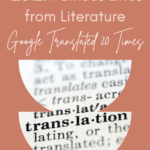This is just a silly way to spend a few minutes and test your literary knowledge, but it also shows just how difficult a translator’s job is. Translating the literal meaning of a word into another language is only one small part of publishing literature in another language. The connotations of each word have to be considered: a cottage in the forest and a cabin in the woods have an almost identical literal meaning, but the connotations are very different. A cottage in the forest is a cottagecore dream. A cabin in the woods is a horror story waiting to start. Each language has its own nuances and viewpoint. Some emphasize gender more than others: when translating a fantasy novel into a language which has gendered nouns, how do you decide the gender of each invented object? Languages structure their grammar in different ways, and there may be missing information to make those connections. For example, if a language uses a different word for maternal grandmother versus paternal grandmother, but the English source material doesn’t specify, which decision should the translator make? These nuances are difficult when translating any text, but literature — and poetry in particular — adds another layer of complexity. Part of the appeal of any book is the author’s unique writing style. How can you properly communicate that in another language? It might involve choosing between communicating all of the literal meaning or effectively mimicking the style. In poetry, every word is carefully chosen, and that includes not only the meaning, but also the syllable count, the rhyme structure, and more. Translators must use their own discretion and artistic skills to create a work that keeps the feeling of the original work, which always involves choices and sacrifices. They are unsung heroes of the literary world! Try this quiz to test your translation skills and your literary knowledge!





